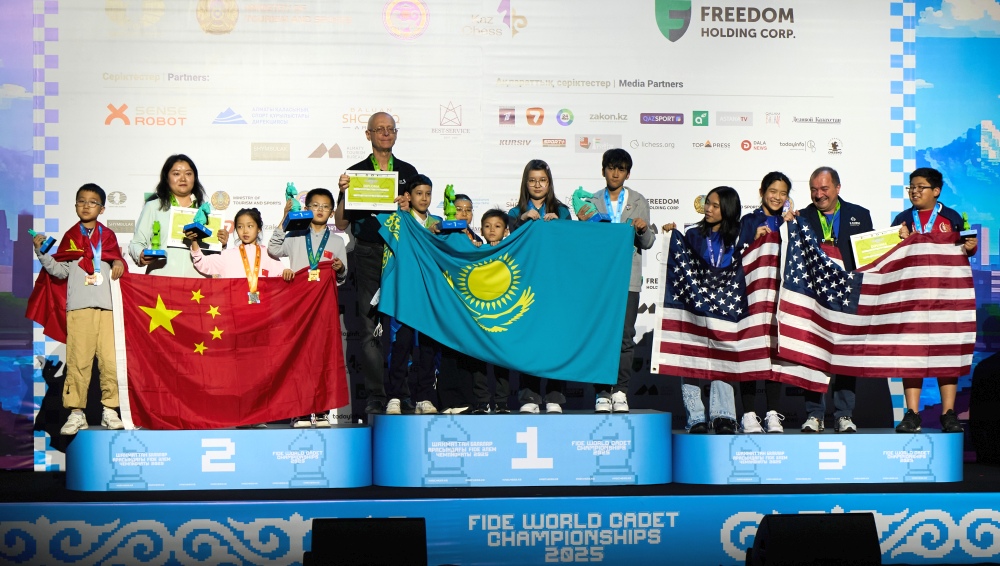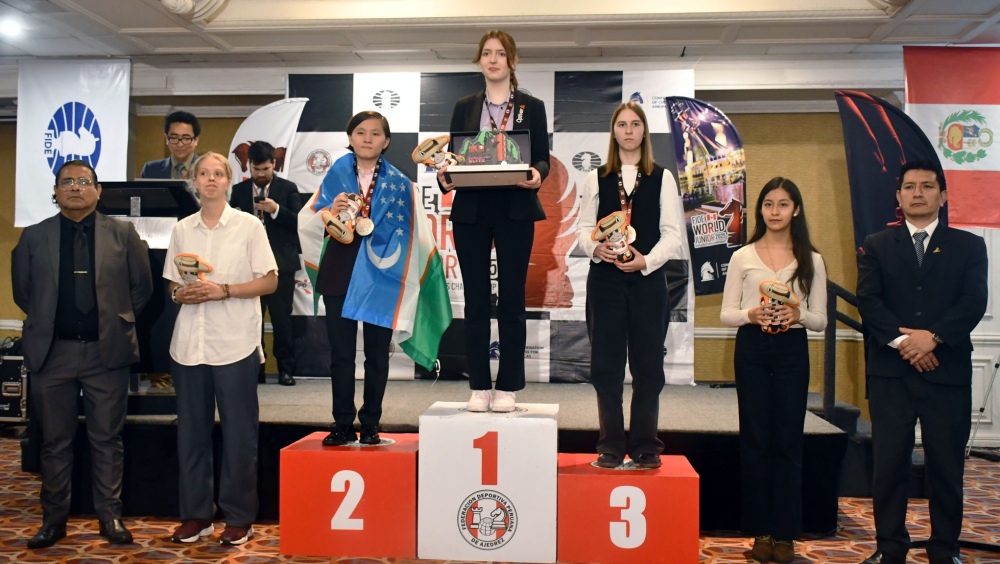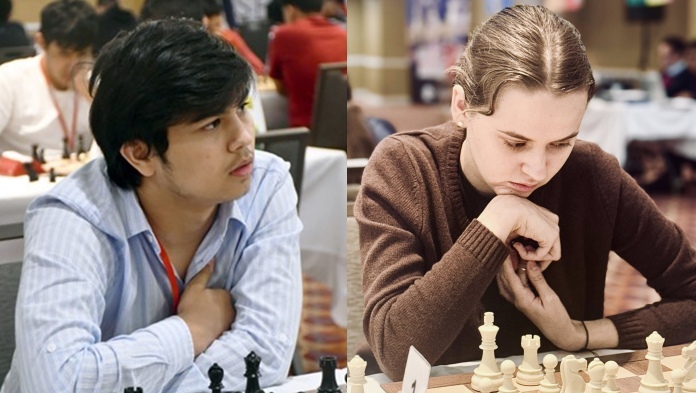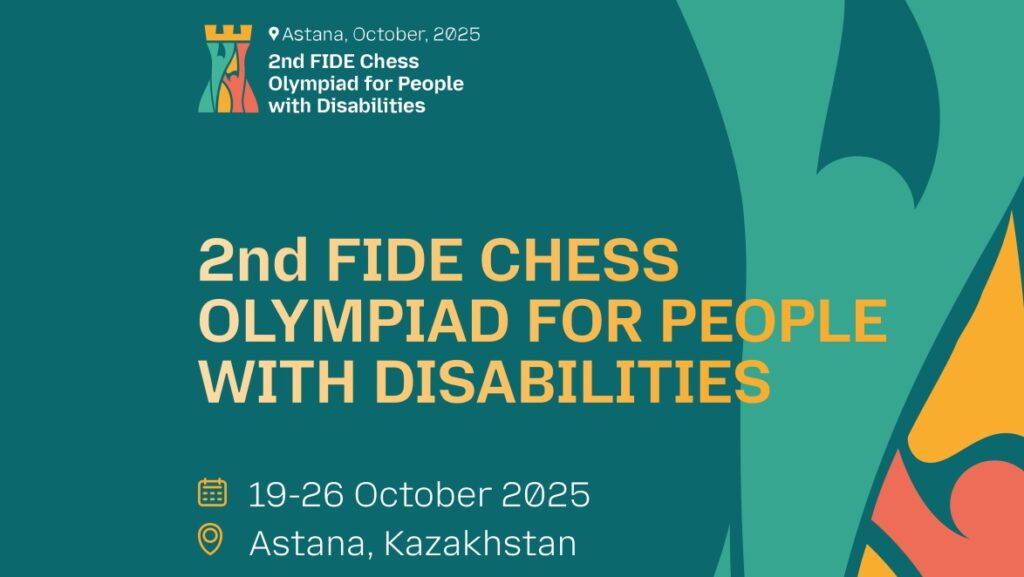World Cadet Chess Championship 2025: Kazakhstan triumphs with three golds and overall team victory

From September 19 to 30, 2025, Almaty became the epicenter of world chess, hosting the World Cadet Chess Championship (U8–U12) at the Baluan Sholak Sports Palace. The event brought together 842 young players from 88 countries, including 229 representatives from all 20 regions of Kazakhstan. The competition was held over 11 rounds under the Swiss system with classical time control: 90 minutes per game plus a 30-second increment per move. Kazakhstan’s young stars—8-year-olds Alisha Bisalieva (Girls U8) and Adinur Adilbek (Open U8), along with 12-year-old Danis Kuandykuly (Open U12)—claimed gold medals, while the national team topped the overall standings for the second year in a row. China and the USA shared second and third, each earning one gold, one silver, and one bronze medal. China edged out the USA in total points scored by medalists—26½ to 25½. The tournament became a true celebration of chess, with young players showcasing skill, character, and strategic talent. Kazakhstan not only hosted a world-class event but also proved the strength of its chess school. “We managed to host one of the largest chess tournaments at the highest level, bringing together a record number of participants and giving Almaty the atmosphere of a true festival. It is especially symbolic that right here, on home soil, our young chess players achieved historic success. Alisha, Adinur, and Danis became world champions, and Kazakhstan showed the world that we have the strongest chess school and already a new generation of leaders who can become big stars tomorrow,” said Timur Turlov, President of the Kazakhstan Chess Federation. FIDE President Arkady Dvorkovich attended the closing ceremony and took part in the prize-giving. In his speech, he expressed gratitude to the participants, organizers, and supporters: “Thank you to the players, media team, and organizers for everything you’ve done over these past days! Your professionalism, energy, emotions, and smiles made this event truly special. Thank you for your passion for the game, your determination to win, and your ability to enjoy the moment. I am confident that these days will remain a lifelong memory for all of us. A special word of gratitude goes to the Government of Kazakhstan and the President of Kazakhstan, the Ministry of Sports and Tourism, the Chess Federation of Kazakhstan and its President, Timur Turlov, Freedom Holding Corp., and to everyone whose support made this tournament possible—with a record number of participating countries.” 2025 World Cadet Chess Championship winners and top finishers: Girls U8 (94 players) Alisha Bissaliyeva (1704, Kazakhstan) – 9½ points Zhu Jiahe (1630, China) – 9 Bold-Erdene Tselmeg (1661, Mongolia) – 8½ Open U8 (150 players) Adinur Adilbek (1935, Kazakhstan) – 9½ points Fedor Sidelnikov (1720, FIDE) – 8½ Wang Yuxuan (1728, China) – 8½ Girls U10 (115 players) WCM Sharvaanica, A S (1971, India) – 9 points WCM Chinzorig Nandinjiguur (1887, Mongolia) – 9 Kiyanna Parihaar (1728, India) – 8½ Open U10 (185 players) Yuan Shunzhe (1805, China) – 9 points CM Le Phan Hoang Quan (2031, Vietnam) – 9 AFM Mani Sarbartho (2072, India) – 8½ Girls U12 (123 players) Lacey Wang (1883, USA) – 8½ points WFM Laurie Qiu (1994, USA) – 8½ Milana Sokolova (1870, FIDE) – 8½ Open U12 (175 players) CM Danis Kuandykuly (2211, Kazakhstan) – 9 points CM Ali Poyraz Ozdemir (2196, Turkey) – 9 CM Ethan Guo (2330, USA) – 8½ Full standings (chess-results) “Kazakhstan managed to take first place in the team standings at the World Cadet Championship for the second year in a row. Last year in Italy we won two golds. This year in Almaty, we won three out of six. One gold each went to the undisputed global leaders—China, India, and the United States. This success is especially pleasing because it happened at home, in front of a record number of countries, 88 in total. It is a tremendous achievement, and we are very proud of our talents,” said Darmen Sadvakasov, First Vice President of the Kazakhstan Chess Federation. Photos: KazChess
FIDE Director for Chess Development visits Antigua and Barbuda

The Antigua and Barbuda Chess Federation warmly welcomed Nigel Short to Antigua. Greeting him on arrival were Hannibal Fleming (President), Matthew Bailey (Vice President), and Julian Piper (Media Manager and PR). Shortly after, the delegation joined a social gathering at the Cedar Valley Golf Club with Sir Vivian Richards (National Hero and legendary cricketer) and Leon “Kuma” Rodney (President of the Antigua and Barbuda Cricket Association). Conversing with Sir Vivian Richards During the evening, Sir Vivian Richards reflected on his connection to chess, recalling a visit from Viswanathan Anand during a tour of India and sharing the inspiration he drew from the 1972 Fischer–Spassky match. The following day, Nigel Short hosted a simultaneous exhibition against some of Antigua’s strongest players, including members of the national team representing the country at Chess Olympiads. He also encouraged the country’s female players, as Antigua plans to send its first women’s team to the 46th Chess Olympiad in Uzbekistan. Short won all eight of his games. The event was attended by His Excellency Sir Rodney Williams and his wife, Sonja Williams, as well as Sir Vivian Richards and Kuma Rodney. Next, Nigel Short and Hannibal Fleming appeared live on ABS Television to discuss the growth and future of chess in Antigua and Barbuda. Meeting with the Prime Minister, Hon. Gaston Browne Afterwards, they met with several government officials: the Honorable Darryl Matthew (Minister of Education, Sports, and Cultural Affairs), the Honorable Paul “Chet” Greene (Minister of Foreign Affairs and President of the National Olympic Committee), the Honorable Prime Minister Gaston A. Browne (Minister of Finance, Investments, and Corporate Governance), and the Honorable Charles Max Hernandez (Minister of Tourism). Each minister expressed strong support for the federation’s initiatives and pledged assistance with future events and resources. The visit also included a stop at the University of the West Indies Five Islands Campus, where the delegation met with Principal Professor Justin Robinson. He emphasized the importance of using chess to strengthen campus life through tournaments and instructional programs. To conclude his trip, Nigel Short visited the Island Academy and Cobs Cross Primary School, where he introduced students to the fundamentals of chess and encouraged them to continue learning the game. Text and photos: Antigua and Barbuda Chess Federation
Wang Hao and Hou Yifan Triumph at 15th National Games of the People’s Republic of China

Grandmasters Wang Hao and Hou Yifan emerged victorious in the Open and Women’s sections of the chess competition at the 15th National Games of the People’s Republic of China. The Jiangsu team won the team event, while Shandong and Hebei took silver and bronze, respectively. The chess competition at the 15th National Games, the highest-level comprehensive multi-sport event in the country held every four years, took place in Shenzhen from September 23–28. It attracted the strongest local players, including former World Champions Ding Liren, Wei Yi, Yu Yangyi, Women’s World Champion Ju Wenjun, Hou Yifan, Lei Tingjie, and Zhu Jiner. The event, played with a 25-minute plus 10-second increment time control, featured Open, Women’s, and Team sections and used a two-stage format: a round-robin preliminary stage followed by semifinals and finals contested by the top four players. The preliminary stage of the Open section produced a minor sensation as seventh-seed Xu Yinglun qualified for the semifinals alongside Wang Hao, Ding Liren, and Xu Xiangyu, edging out higher-rated players Yu Yangyi and Lu Shanglei. Both semifinals—Wang Hao vs. Xu Yinglun and Ding Liren vs. Xu Xiangyu—were tightly contested battles decided by tiebreaks. Wang Hao and Xu Xiangyu prevailed and advanced to the final. In the equally tense final, Wang Hao captured the title by winning the tiebreaker. Ding Liren defeated Xu Yinglun to claim the bronze medal. In the Women’s event, the top-rated players—Hou Yifan, Zhu Jiner, Ju Wenjun, and Lei Tingjie—lived up to expectations and secured spots in the knockout stage. In the semifinals, Lei Tingjie defeated Ju Wenjun, while Hou Yifan prevailed over Zhu Jiner in a very close tiebreak. Hou Yifan dominated the final, whitewashing Lei Tingjie 2-0 to claim the title. In the bronze medal match, Ju Wenjun beat Zhu Jiner in a tiebreak, completing the podium. Photos: CCA
FSI’s new Federal Technical Center open its doors in Spilimbergo, Italy

On September 27, the small town of Spilimbergo in the Friuli Venezia Giulia region, situated between Venice and Trieste, hosted the official inauguration of the new Federal Technical Center of the Italian Chess Federation (FSI). The event’s significance was underscored by the attendance of CONI President Luciano Buonfiglio and Italian Government Minister Luca Ciriani. They were joined by local authorities, including Spilimbergo Mayor Enrico Sarcinelli and his council—key supporters of the project—and representatives of the Friuli Venezia Giulia Region, which provided generous financial backing. The new Center will serve as a dedicated hub for a wide range of activities, including: Technical training camps for the Open, Women’s, and Senior national teams. Sessions for the Federal Chess School and advanced training for promising young talents. Training camps organized by Regional Committees. Conferences and refresher courses for instructors, referees, and sports managers. National and local sporting events. This centralizes functions that were previously outsourced to various hotels on a case-by-case basis. “The purchase of this property is a turning point for our Federation,” said FSI President Luigi Maggi. “It is a true watershed moment in our century-long history that will make us even stronger and more capable of facing future challenges. It is also a wonderful gift for the 105th anniversary of the Federation, which was founded in September 1920. My thanks go to the Municipality of Spilimbergo and the Friuli Venezia Giulia Region for their concrete support, as well as to CONI and Sport e Salute for their ongoing guidance and contributions to our progress.” Luca Ciriani, Minister for Parliamentary Relations, expressed his satisfaction: “Hosting the Federal Technical Center of the Italian Chess Federation in our region, in Spilimbergo, is a privilege that fills us with pride. We are proud to host such a historic federation and will do our best to support such a demanding discipline. I thank everyone for their commitment, and I am confident that Spilimbergo will rise to the challenge.”
FIDE Council approves targeted amendment to Rating Regulation

The FIDE Council has approved the amendments to the Rating Regulations, effective as of 1st of October, following the proposal from the Qualification Commission. The amendment is designed to ensure the fairness and integrity of the FIDE rating system and provide a level-playing field for all top-rated players. The change will apply to players rated 2650 and above and will affect approximately 70 top-rated Grandmasters. The amendment addresses the application of the 400-point rule. The rule stated that a difference in rating of more than 400 points shall be counted for rating purposes as it were a difference of 400 points. There are no restrictions of how many times it can be applied during a single tournament. The current wording in FIDE Rating Regulations will change to include the following, given here in bold: “8.3.1 For each game played against a rated player, determine the difference in rating between the player and their opponent, D. A difference in rating of more than 400 points shall be counted for rating purposes as though it were a difference of 400 points, for players rated below 2650. For players rated 2650 and above, the difference between ratings shall be used in all cases.” The accuracy of ratings and competitive fairness are paramount for chess. This amendment ensures that rating adjustments at the highest level accurately reflect a player’s performance against a pool of statistically equal opponents, safeguarding professional standards set by FIDE.
Winners crowned at FIDE World Junior Rapid & Blitz Championship 2025

For five days, Lima became the world’s chess capital. The Peruvian capital hosted the World Rapid and Blitz Championship, bringing together brightest young chess talents. In an atmosphere of intensity and high expectations, the clock ticked as fast as the plays unfolded, demanding not only creativity from the players but also absolute composure under pressure. Many games were decided in mere minutes, offering spectators a mix of spectacle, drama, and brilliance. The Peruvian audience responded with passion, filling the playing halls and proving that chess, in its most accelerated form, can be lived and celebrated with the energy of a true sporting event. Between draws, crushing victories, and heartbreaking defeats, Lima pulsed with the excitement of a discipline that allows no respite. By the end of five intense days, it was clear that this World Championship not only crowned new champions but also established Peru as a prominent stage on the international chess calendar. Below is the list of winners: Girls – Rapid WGM Xeniya Balabayeva (KAZ) – 7 WIM Afruza Khamdamova (UZB) – 6.5 WFM Varvara Poliakova (FIDE) – 6.5 Final standings Girls – Rapid Open – Rapid IM Mukhammadzokhid Suyarov (UZB) – 7.5 GM Mukhiddin Madaminov (UZB) – 7 GM Denis Lazavik (FIDE) – 7 Final standings Open – Rapid Girls – Blitz IM Eline Roebers (NED) – 12/13 WIM Umida Omonova (UZB) – 9.5 WFM Aliaksandra Tarasenka (FIDE) – 9 Eline Roebers delivered a commanding performance, clinching the title with a round to spare. The IM from the Netherlands scored an impressive 12/13, conceding just two draws. Final standings Girls – Blitz Open – Blitz GM Mukhiddin Madaminov (UZB) – 12/13 GM Denis Lazavik (FIDE) – 11.5 IM Mukhammadzokhid Suyarov (UZB) –10 The competition turned in an exciting race of GMs Mukhiddin Madaminov and Denis Lazavik. The runner-up of the Open – Rapid, Mamadinov seized the lead in Round 9 and preserved it to the end, finishing a half-point ahead of Lazavik. Final standings Open – Blitz Text and photos: Patricia Claros Aguilar Official website: fidewj2025.com/
FIDE World Junior Rapid Championship 2025: Suyarov and Balabayeva capture titles

The FIDE World Junior Rapid Chess Championships concluded in Lima with remarkable victories that highlighted the strength of the new generation of players. IM Mukhammadzokhid Suyarov (Uzbekistan) and WGM Xeniya Balabayeva (Kazakhstan) are the newly crowned World Junior Rapid Champions, winning the open and girls’ sections, respectively. With two grandmasters and several strong international masters in the field, the open tournament was tightly contested and went down to the wire. Heading into the final ninth round, three Uzbek players—Mukhammadzokhid Suyarov, Mukhiddin Madaminov, and Khumoyun Begmuratov—shared the lead with 6.5/8, closely followed by six players (including top seed GM Denis Lazavik) on 6/8. After Madaminov drew with Maksim Tsaruk and Lazavik defeated Begmuratov, Suyarov got his shot at gold—a chance he did not miss. Playing the white side of a Ruy Lopez, he prevailed over Juan Jose Cano Alcaraz (Colombia), clinching the title with an excellent score of 7.5/9. Four players tied for second place, with Madaminov and Lazavik taking silver and bronze, respectively, thanks to superior Buchholz tiebreaks. Final standings Open The girls’ event was equally strong and exciting. Despite a second-round setback against WFM Varvara Poliakova (FIDE), Xeniya Balabayeva reeled off five straight victories to seize the lead. Peruvian Grandmaster Deysi Cori, one of Latin America’s most celebrated chess players, made a special appearance at the final round of the Women’s World Junior Rapid Chess Championship in Lima, where she made the ceremonial first move. Her participation highlighted the importance of inspiring the next generation and added a symbolic touch to the event’s closing day. Entering the final round on 6.5/8, half a point ahead of three pursuers, Xeniya achieved a winning position against one of her main rivals, WIM Afruza Khamdamova, but misplayed it and had to settle for a draw. That result was enough to secure the title, as her other challengers, Poliakova and Anna Zhurova, split the point after a long battle. Khamdamova and Poliakova earned silver and bronze, respectively, edging out Zhurova on tiebreaks. Final standings Girls Photos: Patricia Claros Aguilar Official website: fidewj2025.com/
FIDE Director for Chess Development visits Dominica to foster chess growth

GM Nigel Short welcomed on arrival by Carlton Morvan, President of the Dominica Chess Federation From 20 to 23 September 2025, Grandmaster Nigel Short, FIDE Director for Chess Development, visited the Caribbean island of Dominica (not to be confused with the Dominican Republic). The visit carried special significance: his first trip in 2021 had inspired local players to establish the Dominica Chess Federation, which was formally registered and admitted as a FIDE member later that same year. Since then, chess life in the country has developed rapidly. Today, the Federation unites 67 registered members and around 100 active players, while approximately 1,500 island residents have been introduced to the game. Dominica fielded teams at the 2022 Chess Olympiad in the open section and at the 2024 Olympiad in both the open and women’s categories. National players have also participated in the prestigious CARICOM International Chess Tournament in 2024 and 2025, as well as in internationally rated hybrid competitions. The Federation regularly stages national championships and open and women’s tournaments. In 2025, in collaboration with the Confederation of Chess for America, it organised the island’s first chess festival, an event that attracted broad media coverage and became a milestone for the wider community. Particular attention is being given to work with youth and schools. After receiving 400 chess sets from the Confederation of Chess for America in collaboration with the Gift of Chess programme, the Federation began distributing them to educational institutions. Already, eight Dominican schools have their own chess clubs, where students engage in training sessions, masterclasses, and tournaments. Chess life is also sustained online: interisland competitions are held every Sunday on lichess.org, while on Thursdays, players gather for regular meetings on the University of the West Indies campus. Women and girls in Dominica receive additional support through the Queen’s Gambit Challenge—a global initiative of the FIDE Commission for Women’s Chess. This programme provides free training and mentorship designed to strengthen skills and confidence, creating opportunities to represent the country on the international stage. Simultaneous exhibition at the Fort Young Hotel: Nigel Short playing against 20 participants During his September 2025 visit, Nigel Short met again with the Federation’s leadership and the country’s leading players. His schedule included a simultaneous exhibition at the Fort Young Hotel, where seventeen young talents and three invited participants took their places at the boards. The event drew a large audience, who watched with keen interest and were inspired by the Grandmaster’s skill. The visit also included stops at St. Mary’s Academy and Convent High School. At St. Mary’s Academy—the Federation’s most successful Chess in Schools institution and winner of the 2024 School Chess Tournament—GM Short met with Principal Mrs. Sylvia Jno. Baptiste, who highlighted the school’s progress and commitment to chess education. The Grandmaster spoke to students about the global benefits of chess, engaged with them directly, and presented commemorative chess pins to over twenty students in a special ceremony. Nigel Short with Principal Mrs Sylvia Jno. Baptiste and members of the chess club at St. Mary’s Academy At Convent High School, GM Short was welcomed by Principal Ms. Isabella Prentice and club teacher Mr. Nicholas Goldberg. In a lively discussion with more than twenty students, including national women’s champion Ayani Casimir, he shared advice on improving their play, encouraged them to work hard, and answered questions about his career and experiences at the highest level of the game. Nigel Short with students of the Convent High School chess club Beyond the schools, the programme featured meetings with representatives of the tourism sector and potential partners, as well as a press conference and interviews focused on the development of chess in Dominica and across the Caribbean. The Dominica Chess Federation regards this visit as a fresh impetus for the growth and consolidation of the national movement. Support from FIDE, the attention of international experts, and the enthusiasm of the local community are creating a strong foundation for the further advancement of chess on the island and for Dominica’s deeper integration into the global chess family.
Queen’s Gambit Challenge: Empowering over 580 women from 80+ countries

The FIDE Commission for Women’s Chess proudly hosted the opening ceremony of the Queen’s Gambit Challenge – Intermediate Stage, a groundbreaking initiative designed to empower women in chess and prepare them for future representation on the international stage. The ceremony brought together women of all ages, cultures, and backgrounds, with players represented from over 80 countries worldwide, showcasing the global reach and inclusivity of the program The Intermediate Stage of the Queen’s Gambit Challenge offers free chess training primarily for female players from Levels 3, 4, and 5 federation countries who are ready to build on their foundation and sharpen their skills for higher levels of competition. This stage provides structured online training with experienced coaches, focusing on practical middlegame and endgame techniques, advanced strategies, and tournament preparation. Beyond improving chess strength, the program also serves as a pathway for participants to prepare for representing their countries at the Chess Olympiad, while fostering international connections among women in chess through a supportive and diverse learning environment. Over 580 women have registered to take part in the program. The event was opened by Tris-Ann Richards (Lead Coordinator), who highlighted the extraordinary progress achieved in the first stage of the program and reaffirmed its mission to create opportunities for women. “Every move you make in this program is not just a step for yourself but a step forward for women’s chess globally.” The Chair of the FIDE Commission for Women’s Chess, Anastasia Sorokina, delivered a heartfelt remark emphasizing the importance of sustained investment in women’s chess development. She underscored how initiatives like the Queen’s Gambit Challenge help build confidence and create pathways for future Olympiad teams. Present also was Francisco Cruz, Vice President of FIDE America and Chair of the Diversity Commission, who praised the program for bridging cultural and geographic divides. He encouraged participants to see chess as not only a competitive pursuit but also a tool for personal growth, resilience, and unity. Introducing the coaches The coaches assigned to guide participants throughout the stage are: Leonid Sandler Jomo Pitterson Khadidja Latreche Steel Shirley Castillo Sanchez Denise Bouah Deborah Richards Porter Russel Porter Sadiqah Razak Ryan Blackwood Milena Shahazizyan Program structure and next steps The Intermediate Stage will run from September 20 to November 2, 2025, with a clear structure designed to balance flexibility with rigor. Sessions are held in English, French, and Spanish and specifically tailored to each age group and time zone. Looking ahead The Opening Ceremony successfully set the tone for a program that is about far more than chess. It represents a global sisterhood of players, united by a common goal: to elevate their skills, strengthen their federations, and pave the way for greater women’s representation at the highest levels of the game. The program will culminate in a closing ceremony on November 2, 2025. The next phase of the Queen’s Gambit Challenge will support National Female Teams preparing for their first Olympiad and commence in March 2026.
2nd FIDE Chess Olympiad for People with Disabilities: List of teams announced

FIDE is pleased to announce the official list of participating teams for the 2nd Chess Olympiad for People with Disabilities, to be held from October 19–26, 2025, in Astana, Kazakhstan. Following the success of the inaugural edition in Belgrade in 2023, the event once again brings together players from all over the world to celebrate inclusivity, fair play, and the unifying power of chess. A total of 35 teams will compete in Astana, with participation from all four continents, the three international associations of players with disabilities, and additional nominations from the FIDE President and the host federation. Participating teams Europe – 9 teams Poland, Hungary, Israel, Ukraine, Germany, Croatia, Czech Republic, North Macedonia, Serbia Asia – 7 teams FIDE, Philippines, India, Bangladesh, Myanmar, Uzbekistan, United Arab Emirates Americas – 7 teams Cuba, Venezuela, Argentina, Colombia, USA, Chile, Panama Africa – 5 teams Egypt, Zambia, Zimbabwe, Uganda, Kenya International Associations of Players with Disabilities – 3 teams International Braille Chess Association (IBCA), International Chess Committee of the Deaf (ICCD), International Physically Disabled Chess Association (IPCA) Nominations of the FIDE President – 2 teams Kazakhstan ICCD, FIDE 2 Host Federation – 2 teams Kazakhstan 1, Kazakhstan 2 With 2025 declared the Social Chess Year, this Olympiad highlights FIDE’s continuing commitment to making chess accessible to everyone, regardless of physical abilities. With strong representation across continents and organizations, Astana is set to welcome a truly global competition that embodies the spirit of inclusion and the universal language of chess.

